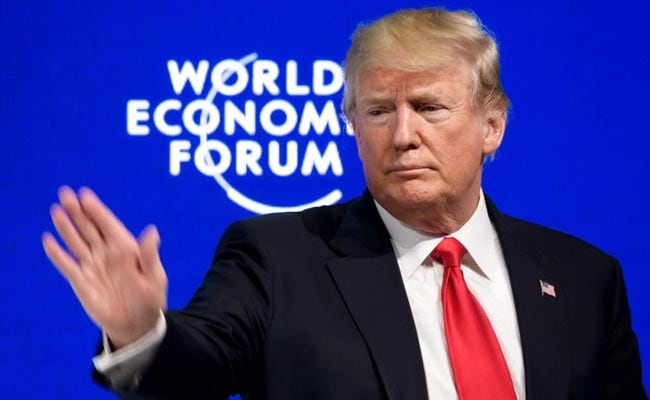

- Home/
- Top Stories/
- Donald Trump Talks Chain Migration In Davos. What It Means For Indians
Advertisement
Donald Trump Talks Chain Migration In Davos. What It Means For Indians
Edited by Aloke Tikku | Updated: January 26, 2018 22:40 IST

Indians make up for 6% of the 43.3 million foreign-born population in the United States
Highlights
- Donald Trump insists on merit-based migration system
- He wants to replace current system of extended family chain migration
- But elimination of chain migration can affect Indian Americans
DAVOS: In his address at the World Economic Forum, US President Donald Trump on Friday pitched the overhaul of the immigration system pushed by his administration "as a matter of both national and economic security" and made a pointed reference to the extended family chain migration.
"We must replace the current system of extended family chain migration with a merit-based system of admissions that selects new arrival based on their ability to contribute to the economy to support themselves financially and strengthen our country," the US President told his audience of politicians and leaders of industry, technology and finance.
The elimination of chain migration would adversely affect Indian Americans who are planning to bring their family members to the United States.
An analysis by the Center for Immigration Studies on immigration through chain migration - where people granted a green card bring their family members to the US - an average immigrant from India eventually sponsored over five additional immigrants.
Between 1996 and 2000, the study, "Multiplying Diversity" said there were 36,160 new immigrants to the US and 184,830 sponsored family immigrants. In 2016, according to its analysis, Indians made up for 7 per cent of the 4.3 million people on the waiting list for family-based immigrant visas, the third largest group after Mexico and Philippines.
A study by the Washington DC based think-tank Migration Policy Institute, says only half of the Indians granted permanent residence in the United States in 2015 received the green card through employer sponsorship. "The remainder qualified as immediate relatives of US citizens or through other family-sponsored channels," it said.
President Trump's remarks on the immigration system that he insisted was "stuck in the past" comes amid negotiations over some 700,000 immigrants brought into the United States illegally as children who face deportation as early as March.
An impasse over the future of these immigrants - called "Dreamers" - had recently shut down the government for three days. Before he left for Davos, President Trump had signalled that a broader deal might be within reach.
Before the global business elite in Davos, President Trump underlined that he, like other world leaders, was driven by his country's national interest. "We support free trade but it needs to be fair and reciprocal," he said, a message that America First did not imply America alone.
"We must replace the current system of extended family chain migration with a merit-based system of admissions that selects new arrival based on their ability to contribute to the economy to support themselves financially and strengthen our country," the US President told his audience of politicians and leaders of industry, technology and finance.
The elimination of chain migration would adversely affect Indian Americans who are planning to bring their family members to the United States.
An analysis by the Center for Immigration Studies on immigration through chain migration - where people granted a green card bring their family members to the US - an average immigrant from India eventually sponsored over five additional immigrants.
Between 1996 and 2000, the study, "Multiplying Diversity" said there were 36,160 new immigrants to the US and 184,830 sponsored family immigrants. In 2016, according to its analysis, Indians made up for 7 per cent of the 4.3 million people on the waiting list for family-based immigrant visas, the third largest group after Mexico and Philippines.
A study by the Washington DC based think-tank Migration Policy Institute, says only half of the Indians granted permanent residence in the United States in 2015 received the green card through employer sponsorship. "The remainder qualified as immediate relatives of US citizens or through other family-sponsored channels," it said.
President Trump's remarks on the immigration system that he insisted was "stuck in the past" comes amid negotiations over some 700,000 immigrants brought into the United States illegally as children who face deportation as early as March.
An impasse over the future of these immigrants - called "Dreamers" - had recently shut down the government for three days. Before he left for Davos, President Trump had signalled that a broader deal might be within reach.
Before the global business elite in Davos, President Trump underlined that he, like other world leaders, was driven by his country's national interest. "We support free trade but it needs to be fair and reciprocal," he said, a message that America First did not imply America alone.
Published: January 26, 2018 21:58 IST
Latest Videos
More VideosComments












